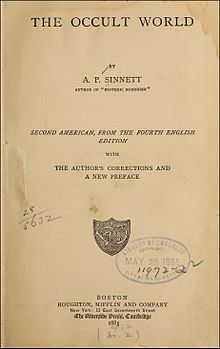The Occult World

2nd American edition, 1885
|
|
| Author | A. P. Sinnett |
|---|---|
| Country | United Kingdom |
| Language | English |
| Subject | Theosophy |
| Publisher | Trübner & Co |
|
Publication date
|
1881 (1st edition) |
| Pages | 172 |
| OCLC | 20697259 |
| Text | at |
The Occult World is a book originally published in 1881 in London; it was compiled by a member of the Theosophical Society A. P. Sinnett. It was the first theosophical work by author; according to Goodrick-Clarke, this book "gave sensational publicity to Blavatsky's phenomena" and the letters from the mahatmas and drawn the attention of the London Society for Psychical Research.
In September and October 1880 Blavatsky and Olcott visited at Simla Sinnetts. Sinnett expressed serious interest in the work and teachings of the Theosophical Society, and it prompted Blavatsky help him to install contact and correspondence with two adepts, which sponsored the Society, the mahatmas Kuthumi and Morya. He able to gather the material for his first theosophical book, which was based mostly on his notes of Blavatsky's occult work, and which "made her name widely known, though it contained nothing from her pen."
In the second half of the 1880 Anglo-Indian newspaper The Pioneer published several individual and collective reports of witnesses of Blavatsky's occult phenomena, in particular, 7 November 1880 a report, which was written by Sinnett himself. In 1881, he incorporated these reports in his book. In February 1881 Kuthumi, writing that he is interested in the Sinnett's book and its success, has given permission to use his letters: "I lay no restrictions upon your making use of anything I may have written to you..., having full confidence in your tact and judgment as to what should be printed and how it should be presented." In March 1881 Sinnetts went on vacation at England, there was supposed to find a publisher for The Occult World. The book was published in June 1881 during the author's stay in London. In July 1881 Sinnett returned to India, and on the next day after the arrival he received a letter, in which Kuthumi congratulated him on the publication. Kuthumi wrote: "When the first hum and ding-dong of adverse criticism is hushed, thoughtful men will read and ponder over the book."
...
Wikipedia
